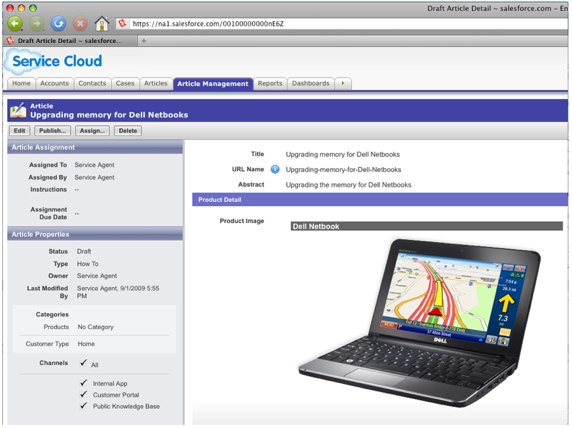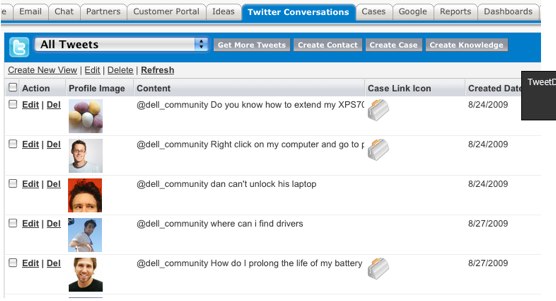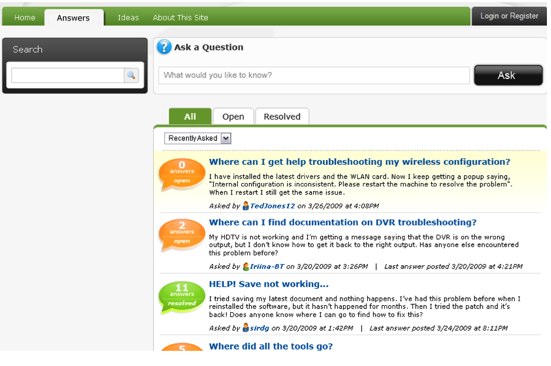
In Salesforce.com’s most recent earnings call, Salesforce founder and CEO Marc Benioff strongly emphasized that the Service Cloud, which was launched in January, was one of the fastest growing segments of the company’s business. A customer service SaaS application, the Service Cloud has quickly accumulated 8,000 customers and has gained a 55 percent market share in the customer service platform arena, according to Salesforce.
Today, Salesforce is announcing a significant upgrade to its product, dubbed the “Service Cloud 2,” adding additional functionality in three areas of the product. The basic idea behind the Service Cloud is to capture crowdsourced pools of knowledge floating across the internet and use them for commercial customer service, potentially replacing traditional on-premise contact center technologies which are disconnected from on-demand knowledge that can be found in the cloud.
Here are the new innovations that Salesforce has packaged in Service Cloud 2:
Salesforce Knowledge: Powered by technology Salesforce acquired through Instranet, Salesforce will offer clients a knowledge base platform, which will allow customer service agents to quickly tap into a SaaS knowledge database. Built on top of the Force.com platform, Salesforce will provide businesses with the technology to organize customer service information into organized repository, making it easy for reps to quickly find the right answer for an inquiry.
Google search, which Salesforce says is a important resource for customer service reps, will be integrated and easily accessible in the platform. Salesforce says that businesses can easily deploy changes into the knowledge base and extend the platform to mobile devices and other websites. The knowledge base is price at $50 per user per month and will be available on the Service Cloud 2 in the fourth quarter of 2009.
Salesforce Answers: From the its initial launch, the Service Cloud has leveraged crowdsourcing to incorporate knowledge into the platform, but with this new release, Salesforce is helping businesses looking to the web for answers. Online forums and social networks, like Facebook, hold a vast amount of knowledge from consumers.
Salesforce Answers will create a customizable website that will facilitate question and answer conversations and will filter the knowledge created on Salesforce Answers directly into the Service Cloud’s knowledge base, ensuring that customers, agents and partners will all have access to the best knowledge available. Answers will also allow companies to set up a Salesforce Answers community directly on a Facebook company fan page, that will import knowledge into the Service Cloud. For example, on Dell’s Facebook Fan page, questions and answers answered by the Facebook community will be imported into the Answer base in the Service Cloud. Salesforce Answers is will available in the first half of 2011.
Salesforce for Twitter: Salesforce was one of the first CRMs to integrate with and leverage Twitter back in March but has added to this functionality in the Service Cloud. Similar to the feature added earlier this year, users will be able to search Twitter in a real-time stream, will be able to monitor and track particular conversations in Twitter around a search term. And users can Tweet directly from the Service Cloud.
The Service Cloud will now let businesses create a Twitter handle for customers to directly Tweet their customer service issues to. When a customer complains to the handle on Twitter, a customer service case is automatically created in the Service Cloud, letting the representative respond to the customer’s questions in a timely manner, linking back to the Knowledge Base. Salesforce for Twitter is available today for free on the Force.com AppExchange.
Leveraging the cloud when it comes to customer service is a powerful way of integrating the social web with the enterprise space, as we’ve written in the past. Salesforce.com and Benioff have been at the helm of this movement and today’s upgrade to the Service Cloud represents the company’s continued innovative strategies that seem to deliver real value to enterprise customers. Salesforce’s Vice President of Product Marketing Kraig Swensrud told me today that the reason Salesforce delivered a new version of the Service Cloud so quickly was primarily in response to customer demand. Basically, enterprise clients saw the increased trend of customers having conversations about products and service on social channels and Salesforce saw an opportunity to help companies figure out how to tap into this arena.
Salesforce currently has fairly big-name customers who are using the service cloud, including Starbucks, Comcast and Dell. But Salesforce isn’t forgetting about the little guy; the company recently launched a lightweight contact manager targeted towards small businesses.

